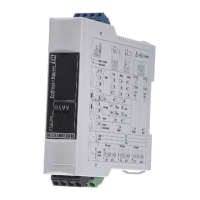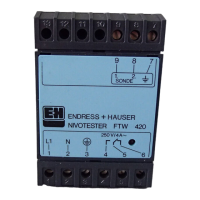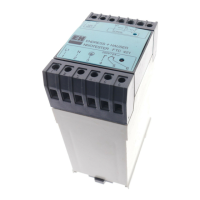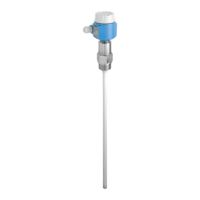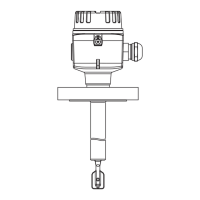6
Input parameters
Measured variable The limit signal can be triggered at minimum or maximum height as required
Measuring range The measuring range is dependent on the installation location of the sensors
Input signal
• Input FTL 325 P: galvanically isolated from power supply and output
• Protection type: intrinsically safe [EEx ia] IIC
• Connectable measuring sensors:
– Liquiphant DL 17 Z, with electronic insert EL 17 Z
– Liquiphant II FDL 30, FDL 31, FDL 35, FDL 36, with electronic insert FEL 37
– Liquiphant M FTL 50/51, FTL 50H/51 H, FTL 51 C, with electronic insert FEL 57
– Liquiphant S (HT) FTL 70/71, with electronic insert FEL 57
– Soliphant DM 90 Z, DM 91 Z, DM 92 Z, with electronic insert EM 17 Z
– Soliphant II FTM 30 S, FTM 31 S, FTM 32 S, with electronic insert FEM 37
• Measuring sensor power supply: from Nivotester FTL 325 P
• Connecting line: two-wire, screening unnecessary
• Line resistance: max. 25 Ω per wire
• Signal transmission: pulse frequency modulation (PFM)
Output parameters
Output signal • Relay output per channel: one potential-free switch contact for the level alarm
• Quiescent current safety circuit: minimum/maximum safety selectable with DIL switch
• Common fault signal relay: potential-free switch contact for fault signalling, of which only two
contacts are routed out
• Switch delay: approx. 0.5 s
• Switching power of the relay contacts:
U ~ max. 253 V
I ~ max. 2 A
P ~ max. 500 VA at cos ϕ ≥ 0,7
U = max. 40 V
I = max. 2 A
P = max. 80 W
• Life: at least 10
5
switching operations at maximum contact load
• Function displays: LEDs for operation, level alarm and fault
Overvoltage category acc.
to EN 61010
II
Protection class II (double or increased insulation)
Failure signal Level limit value relay dropped out; fault signal by red LEDs, fault signal relay dropped out
Galvanic isolation All input and output channels and relay contacts are galvanically isolated from each other

